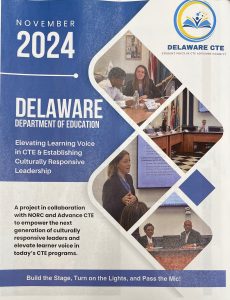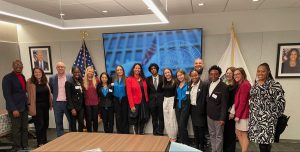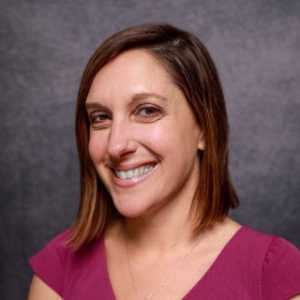 Last month, I had the privilege of attending a briefing at the U.S. Department of Education, led by a group of Career Technical Education (CTE) learners from the state of Delaware. Their expertise and passion demonstrated the true power, inspiration and innovation that can come from centering learners in matters of policy and practice within CTE.
Last month, I had the privilege of attending a briefing at the U.S. Department of Education, led by a group of Career Technical Education (CTE) learners from the state of Delaware. Their expertise and passion demonstrated the true power, inspiration and innovation that can come from centering learners in matters of policy and practice within CTE.
Over the last year, Delaware participated in Advance CTE’s Leveraging Learner Voice to Strength CTE’s technical assistance cohort and this visit to Washington DC was a culmination of this effort. Over the year, Delaware recruited CTE youth leaders to participate in two cohorts:
- One cohort is working to redesign their state’s teacher preparation program of study. Going forward, Delaware is committed to ensuring learners are engaged in the development and re-approval of CTE programs of study as those directly experiencing those pathways, and this group of learners is providing input into both the teacher pathway and the policy and process going forward. As Dr. Jon Wickert, State CTE Director for Delaware noted, “We are looking to CTE youth leaders in how we name programs, how we design programs. Programs should be designed in the ways learners want them to function.”
- The other cohort, focused on building capacity around Diversity, Equity, Inclusion and Belonging in CTE classrooms and Career Technical Student Organizations (CTSOs), co-designed and co-led the state’s 2023 Fall Leadership Conference, which had over 750 middle and high school CTSO learners participating. As Madison Retzlaff, one of the youth leaders and the state president for Educators Rising, shared, “Every voice matters…and everyone should feel a sense of belonging in CTSOs and CTE.”
To prepare these learners to serve as leaders at both the state and local levels, Delaware worked with the National Opinion Research Center (NORC) at the University of Chicago to provide training around culturally responsive instruction and practices.

Presenting to senior leadership within the Office of Career, Technical and Adult Education (OCTAE), including Assistant Secretary, Dr. Amy Loyd, learners explained the construct of culturally responsive teaching practices that they collectively developed and refined as the CTE Youth Leadership Team and how they are individually committing themselves to the implementation of culturally responsive teaching in their roles as CTSO leaders and CTE peers. Jennae Overton, state president of Business Professionals of America (BPA), led the presentation and Ahmad Edwards, who participates in Future Health Professionals (HOSA), offered thoughts on what culturally responsive teaching means to him as a CTE youth leader, noting “I will implement culturally responsive practice [by] honoring each student’s voice. I want every student to be able to open up and express how they feel about a certain topic.”
Armed with a greater understanding of culturally responsive practices and the ins and outs of CTE in Delaware, the learners are now engaging their school-level leaders and teachers on how they can improve access and equity at the district, school and classroom levels. Dr. Wickert reflected that “As a result of this work, we have become more thoughtful on local engagement,” adding that even though the state has invested dollars to encourage a greater focus on equity at the local level, it wasn’t moving the bar as quickly or as far as they had hoped. “With the learners driving this mission and work, I believe it will have a greater impact at the classroom level,” said Dr. Wickert.
As Dr. Michael Hill-Shaner, the Education Associate/Culturally Competent Workforce Lead at the Delaware Department of Education regularly says, “It’s our job to build the stage, turn on the lights and pass the mic.” This briefing and the arc of the last year demonstrate the true power of passing the mic. I personally cannot wait to see what these learners do next and how Delaware and other states continue to live up to the promise of the second principle of CTE Without Limits so that each learner can truly feel welcome in, be supported by and have the means to succeed in the career preparation ecosystem.
Additional Resources:
- Learner Voice Toolkit
- Family Engagement in Career Pathways
- Blog highlighting the Learner Voice Cohort
Kate Kreamer, Executive Director

